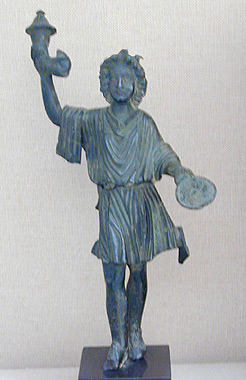Lar
(needs more clearing) |
|||
| Line 5: | Line 5: | ||
It was only in the time of Augustus that the plural ''lares'' was used. | It was only in the time of Augustus that the plural ''lares'' was used. | ||
| − | == | + | =="Keeper of the Gate"== |
| − | The family as we know it today bears little of no relation to that ancient institution of which the ''Lar'' was the Keeper of the Gate. In early history of Rome, the title to the land was possession and use | + | The family as we know it today bears little of no relation to that ancient institution of which the ''Lar'' was the "Keeper of the Gate". In the early history of Rome, the title to the land was possession and use, because it was to a Roman the source of his life, its cultivation gave him occupation, upon the land he build his house and in the land he made his grave, therefore the land to the archaic man was sacred; for not only was it the home of the living, it was also the place of the dead, and it was the dead ancestors in their graves who really possessed the land and, as the ''Lares'', were the "Keepers of the Gates". |
==Fear and reverence of the ''Lares''== | ==Fear and reverence of the ''Lares''== | ||
Revision as of 17:11, 31 March 2009
Home | Latíné | Deutsch | Español | Français | Italiano | Magyar | Português | Română | Русский | English
⚜⚜⚜ Site Index - Key Pages ⚜⚜⚜
The Lar, known also as the Lar familiaris, was the Roman household deity who protected the land that the family lived upon. The Lar was the center of the household cult, his shrine, known as a lararium was usually in one of the common rooms of the house, so the entire family and slaves could make offerings, always on the Kalends, Nones and Ides, as well as on special occasions such as banquets. It was only in the time of Augustus that the plural lares was used.
"Keeper of the Gate"
The family as we know it today bears little of no relation to that ancient institution of which the Lar was the "Keeper of the Gate". In the early history of Rome, the title to the land was possession and use, because it was to a Roman the source of his life, its cultivation gave him occupation, upon the land he build his house and in the land he made his grave, therefore the land to the archaic man was sacred; for not only was it the home of the living, it was also the place of the dead, and it was the dead ancestors in their graves who really possessed the land and, as the Lares, were the "Keepers of the Gates".
Fear and reverence of the Lares
The belief of the ancient man in the ghosts of his fathers, with their unknown power to help and harm, was better than a title deed to secure each man in the possession of his land. Every family feared the Lares of every other family. The earth in those days was peopled with a host of spiritual beings — unseen, unheard, smiting with the pestilence, and killing with the plague. If any untoward accident befell a man, or sickness came to him after he had trespassed on his neighbor's land, then he, as well as his neighbor, ascribed his misfortune to the wrath of the Lar of that land. Thus each man had a wholesome fear of the ghosts of his neighbor. He was ready to fight his neighbor, whom he could see, but not his neighbor's ghosts, whom he could not see.
Sacredness of private property
In the good old days every house was haunted and every field bewitched, and it was the haunt and the bewitchment that was the safety of the house and the land. Domestic religion was the keeper of domestic wealth and life. It was the fear of the Lares that gave sacredness to property and made theft and trespass not only a crime but a sacrilege.
This sacredness of property was religion in its origin. It existed for centuries before it gave rise to the civil laws that are now its security. Long before the reign of the law we had the reign of Lar. Each house-father, absolute lord and master of his own house and land, was under the protection of his Lar; the fear of them and the dread of them was upon all the country-round about. If his lands were seized by a stronger man than he, his Lar were expelled from the land, the graves of his ancestors violated, and he and his household were either killed or reduced to slavery.
This relation of the family to the land, and of the house-father to the family, classified ancient society as master and slave, patron and client, patrician and plebeian. With the institution of the family, there came into existence a class of out-family men and women: runaway slaves, prodigal sons, remnants of broken families; men and women without land, without Manes, without Lares, having no place at any family altar. Private property in land, the basic principle of the family, was the fruitful cause of poverty, with the wretchedness and degradation that always follow in its camp. That same poverty is today destroying the family and changing the face of civilization.
Private property in land has, in the course of time, passed out of the keeping of the family Lar into the care of the civil law; what man had once to do for himself society now does for him. The "Keepers of the Gates" were no longer the Lares but the lawyers.
